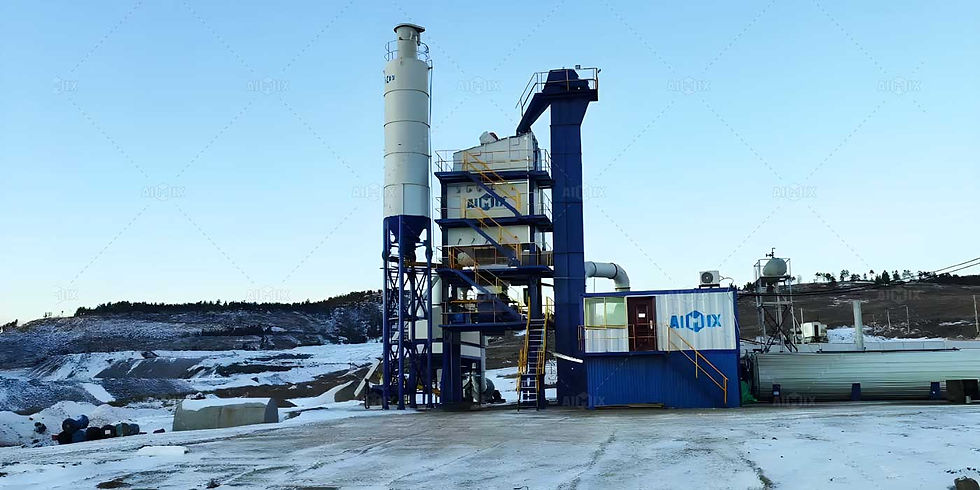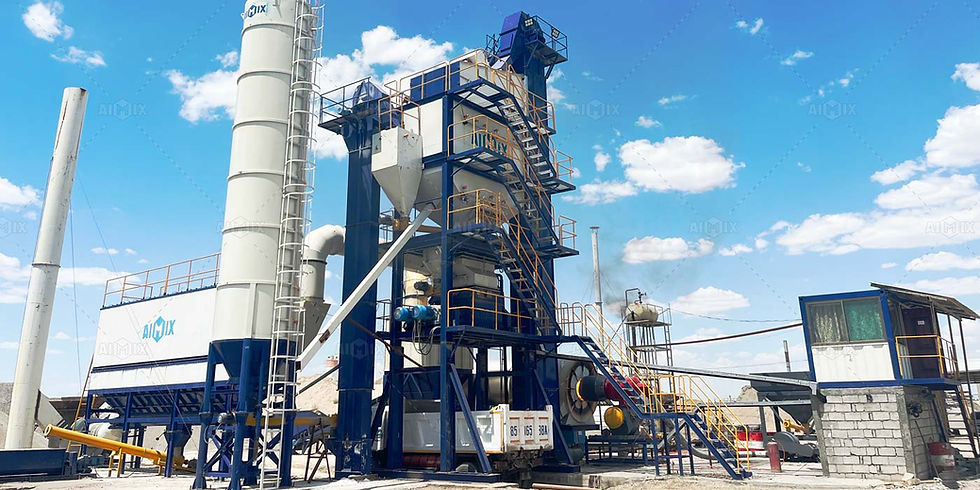What Capacity of Mobile Asphalt Plant Is Suitable for Producing 15,000 Tons/Month for 3 Cities?
- aimixglobal5
- Jul 20, 2025
- 3 min read
For construction contractors managing multiple paving projects across different cities, choosing the right mobile asphalt plant is a major decision. If your target is to produce 15,000 tons of asphalt per month for three cities, selecting the right mobile asphalt plant capacity is critical to ensure efficiency, cost control, and timely delivery. In this post, I’ll help you break down the key considerations and guide you to the most suitable capacity range.

Understanding Your Monthly Asphalt Demand
Let’s start by analyzing the demand. Producing 15,000 tons/month across three cities means roughly 5,000 tons per city. If your project is active 25 working days per month, that’s 200 tons per day per city.
This number is not too small. It requires consistent output and flexible mobility to keep up with paving schedules. So, any underperforming or oversized plant may affect your budget and timelines.
Why Mobile Asphalt Plants Make Sense
Compared to stationary plants, mobile asphalt plants are more flexible. The asphalt mixing plant portable can be moved between cities, reduce logistics costs, and respond quickly to shifting project locations. For contractors working in 2–3 regions or rotating projects, this flexibility translates directly into profit and efficiency.

Matching Capacity with Daily Output Needs
Now, let’s align the expected production with the right plant capacity. As mentioned, each city requires 200 tons/day. That means your mobile asphalt plant must be able to deliver this without overloading.
Option 1: 60–80 TPH Mobile Asphalt Plant
This capacity is suitable if your production is spread over two shifts or you plan to rotate one plant between two nearby cities. It can produce about 1,500–2,000 tons per week, which meets the target with proper scheduling.
Option 2: 100–120 TPH Mobile Asphalt Plant
This is the most balanced choice. It can produce 2,000–3,000 tons per week. With this size, one plant can fully supply a single city, or rotate between two locations. It gives you extra margin for peak demands or weather delays.
Option 3: 160 TPH or Above
If you plan to centralize production and transport asphalt to all three cities, a larger mobile plant may be better. A 160 TPH plant can produce over 4,000 tons per week. However, this increases fuel use, initial investment, and may reduce mobility.

Factors That Influence Your Final Decision
While capacity is important, other factors also impact your choice. Let’s go through them:
1. Distance Between Cities
If your three cities are close together (under 50 km), you can rotate one plant or use one high-capacity plant to serve all. If they are far apart, you may need two smaller mobile units.
2. Road Types and Asphalt Specs
Different roads need different mix designs. If each city has a different road class or specification (e.g. highways vs. local roads), consider using multiple plants to ensure quality and reduce mixing downtime.
3. Labor and Fuel Cost
Larger plants use more fuel and manpower. If your job sites are in rural areas, running a 100–120 TPH unit may be more cost-effective and sustainable.
4. Asphalt Transportation Limits
Hot mix asphalt has a short shelf life. If delivery to the job site takes more than 2 hours, quality may drop. That’s why plant location and output speed must be carefully matched.

Recommendation: Go With 100–120 TPH Mobile Asphalt Plants
For most contractors targeting 15,000 tons/month in 3 cities, the 100–120 TPH mobile asphalt plant is the ideal option. It offers a great balance between output, fuel efficiency, and flexibility. You can use one plant per city or rotate one unit between two regions depending on your setup.
This solution is scalable. You can start with one unit, test your operational model, and add more units as your business expands. It also gives you room to respond to urgent projects or rainy season delays.
Why Work With Us?
At AIMIX, we specialize in mobile asphalt mixing plants that are built for fast deployment and stable operation. Our 100–120 TPH models are well-tested in Indonesia, the Philippines, and across Southeast Asia. We offer full setup assistance, after-sales support, and even local spare parts supply to reduce downtime.
We understand your project demands, especially when dealing with multiple city projects and tight schedules. We can help you choose the best model for your needs and provide a cost-effective solution that ensures consistent asphalt quality and high productivity.

Let’s Build Better Roads—Together
If you’re planning to produce 15,000 tons of asphalt per month across different cities, let’s talk. We’ll help you match your production goals with the right mobile asphalt plant capacity and configuration. Just send us your project details, and we’ll provide a tailored recommendation within 24 hours.
Contact us now and get expert advice, flexible options, and professional support to help your business grow. Get to learn about the specific asphalt mixing plant price at right!



Comments